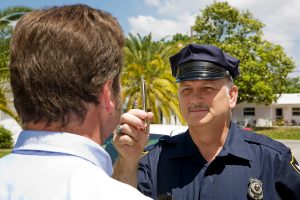If a police officer sees you driving erratically and suspects you of driving under the influence, or if someone reports you, you may have to go through one or more standardized field sobriety tests (SFSTs). SFSTs are designed to test an individual’s balance, coordination, and divided attention. None of these tests are perfect, which is why many officers use evidence from multiple tests to determine whether a Breathalyzer is necessary. Below, our San Jose DUI lawyer explains common field sobriety tests.
Horizontal Gaze Nystagmus (HGN)
The horizontal gaze nystagmus test looks at your ability to control your eyes. It is typically the first SFST administered to determine intoxication.
Erratic eye motion and difficulty tracking objects are common signs of intoxication. The officer may move his or her finger or a pen in front of your face and ask you to follow it smoothly with your eyes.
One Leg Stand (OLS)
The one-leg stand is a divided attention test. Physical balance is often impaired when an individual is under the influence of drugs or alcohol. The officer may ask you to lift one foot and balance on the standing foot while keeping your arms at your side. You might be required to count while you balance. The officer will look for signs, such as:
- Swaying
- Falling
- Lifting your arms to maintain balance
- Hopping
- Putting your foot down
- Losing track while counting
Walk and Turn (WAT)
If the officer asks you to take a certain number of steps along a straight line, he or she is looking for multiple signs of intoxication. During the test, you have to take a set of nine heel-to-toe steps along a straight line, turn around, and return to the start point.
The officer will look for signs that point to intoxication, such as:
- Beginning the test before the officer has finished the instructions
- Not touching heel-to-toe as you walk
- Stopping as you walk
- Lifting your arms to maintain balance as you walk
- Failing to maintain a straight line
- Losing count of your steps
- Losing your balance when you turn around
Are Standardized Field Sobriety Tests Accurate?
SFSTs are not 100 percent accurate. All of these tests have flaws. They identify signs of impairment that can be linked to other conditions or health issues. In addition, environmental conditions can affect the results of these tests.
However, anything observed by the officer during these tests can be used against you in court if you are charged with driving under the influence. It is important to hire a San Jose DUI attorney to fight this evidence and advocate for your rights.
Contact an Experienced DUI Lawyer in San Jose for Your DUI Case
If you have been charged with driving under the influence, you should know that the consequences of a conviction can affect every part of your life. Give yourself the best chance possible and call the Law Offices of Thomas Nicholas Cvietkovich at (408) 898-9770 to discuss your case. You can also contact us online.
Additional Reading:


